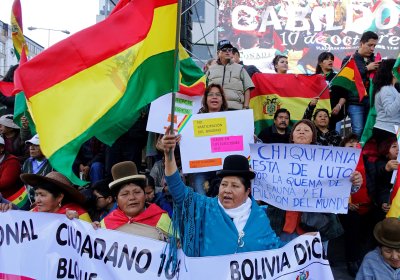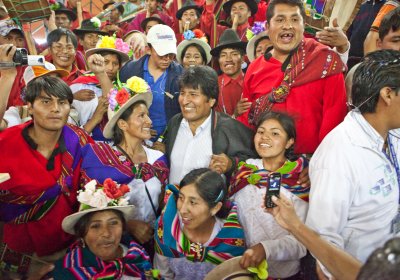Bolivia will head to the polls on October 20 to elect its next president. Recent polls indicate the incumbent leftist president Evo Morales has a substantial lead over his closest opponent, right wing Carlos Mesa and his Citizen Community (Comunidad Ciudadana) party.
MAS
Many analysts have rushed to give their opinions regarding the “crisis of the MAS” and its consequences.
Yet, the Movement Towards Socialism (MAS — the party of President Evo Morales) has always been in crisis — if by crisis we mean internal disputes for power and the existence of personal interests.
Despite this permanent “crisis”, the MAS was able to cohere the majority of plebeian sectors through a kind of corporative alliance.
A series of problems and challenges are facing the Bolivian government of President Evo Morales, the country’s first indigenous head of state, and the process of change it leads has emerged. There has been a range of commentary on these challenges. Green Left Weekly publishes these two pieces as part of our ongoing coverage of the Latin American revolution. The article below is by Eduardo Paz Rada, editor of Bolivian-based magazine Patria Grande. It has been translated by Federico Fuentes.
* * *
Recent scenes of roadblocks, strikes and even the dynamiting of a vice-minister’s home in the Bolivian department (administrative district) of Potosi, reminiscent of the days of previous neoliberal governments, have left many asking themselves what is really going on in the “new” Bolivia of indigenous President Evo Morales.
Since July 29, the city of Potosi, which has 160,000 inhabitants, has ground to a halt. Locals are up in arms over what they perceive to be a lack of support for regional development on the part of the national government.
Ironically, while the left is one of the fiercest critics of biased media coverage, it can also fall in the trap of corporate media distortions, particularly if its coverage dovetails with its own fantasies.
A May 14 article by Daniel Lopez published on the website of Australian group Socialist Alternative is proof of this.
The article echoes the view of a May 10 article on the BBC website, which has a clear dislike of Bolivian President Evo Morales.



